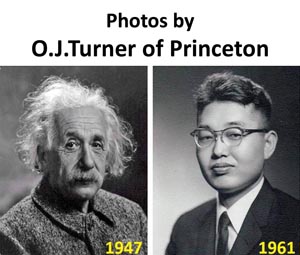Einstein's Philosophy of Physics
Einstein starts as a Kantianist, but becomes a Hegelian while doing physics.

|
- Kant. Many people wrote
about Kant's influence on Einstein. Since I cannot read Kant's long
sentences (sometimes, one sentence covering two pages), I went to the
city where Kant spent the 80 years of his entire life. I then learned
how Kant was influenced by his environment. I finally became aware of
what Einstein inherited from Kant.

Two should become One. 
- Einstein observed that Maxwell's electromagnetic theory and Newton's mechanics
do not obey the same transformation law. He then developed a
Lorentz-covariant mechanics.
- Hegel. Einstein
observed that the energy-momentum relation takes different forms for slow and
fast (and massless) particles. From those two contrasting formulas, he
derived his energy momentum relation resulting in his celebrated
E = mc2.
- Einstein thus combined both
Kant and Hegel
while carrying out these two history-making projects. The bridge
between these Kant and Hegel is the ancient Chinese philosophy of Taoism.
- Thus, Einsteinism combines these three philosophical disciplines and
tells us how to do physics.
- I was thus practicing Einsteinism when I was working on the following
projects.
- Massive and Massless Particles.
Their internal space-time symmetries are different. Can we find one
symmetry covering both?
- The quark and parton models
are applicable to slow and fast protons respectively. They appear to
be quite different. Is it possible to construct one picture applicable to
both?
- This table summarizes what I said above.
You may click here for a story.
Einstein's World Massive/Slow between Massless/Fast Energy
MomentumE=p2/2m Einstein's
E=(m2 + p2)1/2E=p Helicity,
Spin, GaugeS3
S1 S2Wigner's
Little GroupHelicity
Gauge Trans.Hadrons,
Bound StatesGell-Mann's
Quark ModelOne
Lorentz-Covariant
EntityFeynman's
Parton Picture
- Massive and Massless Particles.
Their internal space-time symmetries are different. Can we find one
symmetry covering both?
- Click here for the article for the
proceedings. Click here
to download the article from the ArXiv.
- Rome page. If you do not wish to follow my logic, go to may go to Rome page and enjoy this eternal city.

| |
|